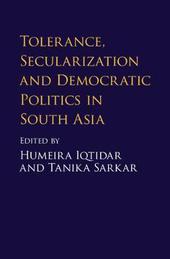
|
Tolerance, Secularization and Democratic Politics in South Asia
Hardback
Main Details
| Title |
Tolerance, Secularization and Democratic Politics in South Asia
|
| Authors and Contributors |
Edited by Humeira Iqtidar
|
|
Edited by Tanika Sarkar
|
| Physical Properties |
| Format:Hardback | | Pages:224 | | Dimensions(mm): Height 235,Width 155 |
|
| Category/Genre | Asian and Middle Eastern history |
|---|
| ISBN/Barcode |
9781108428545
|
| Classifications | Dewey:320.954 |
|---|
| Audience | | Professional & Vocational | |
|---|
| Illustrations |
Worked examples or Exercises; 7 Maps; 1 Halftones, black and white
|
|
Publishing Details |
| Publisher |
Cambridge University Press
|
| Imprint |
Cambridge University Press
|
| Publication Date |
19 July 2018 |
| Publication Country |
United Kingdom
|
Description
What is the relationship between secularization and tolerance? Critically analyzing the empirical and theoretical foundations of a putatively linear relationship between the two, this volume argues for moving past both romanticised readings of pre-modern tolerance and the unthinking belief that secularization will inevitably lead to tolerance. The essays collected in this volume include contributions from across South Asia that suggest that democratic politics have added a layer of complexity to questions of peaceful co-existence. Modern transformations in religious thought and practice have had contradictory implications for tolerance, which offer rich insights into contemporary debates in the region. This multi-disciplinary volume, which spans history, sociology, anthropology and political theory, questions the uncritical acceptance of tolerance as the best framework for engaging with difference, and probes the complications created by and through democratic politics.
Author Biography
Humeira Iqtidar is the author of Secularizing Islamists? Jamaat-e-Islami and Jamaat-ud-Dawa in Urban Pakistan (2011) and led the ERC-funded project, 'Tolerance In Contemporary Muslim Polities: Political Theory Beyond the West'. Tanika Sarkar is author, among other books, of Hindu Wife, Hindu Nation: Community, Religion, Cultural Nationalism (2002) and Rebels, Wives, Saints: Designing Selves and Nations in Colonial Times (2009). Her research lies at the intersections of religion, gender, and politics in colonial and post-colonial India.
Reviews'This volume provides a nuanced and sophisticated understanding of secularism as an ideal and an inconsistent practice in South Asia. Given the ways in which centralized states and material inequalities have undermined secularism, the volume shows that pleas for tolerance cannot adequately rectify its deficiencies.' Amrita Basu, Amherst College, Massachusetts 'At a time when issues of religious intolerance in South Asia are so much in the news, this is a very welcome and timely collection of essays. Taking us beyond abstract theorizing, the book provides a vibrant look at the relationship between secularization and democracy across five South Asia countries - all of them struggling, in different ways, with the creation of democratic political orders. 'Secularization', 'tolerance', and 'religion' are not abstract concepts in these essays, but changing ideas embedded in specific political conflicts. ... Taken together, the essays will transform how we think about these concepts.' David Gilmartin, North Carolina State University
|